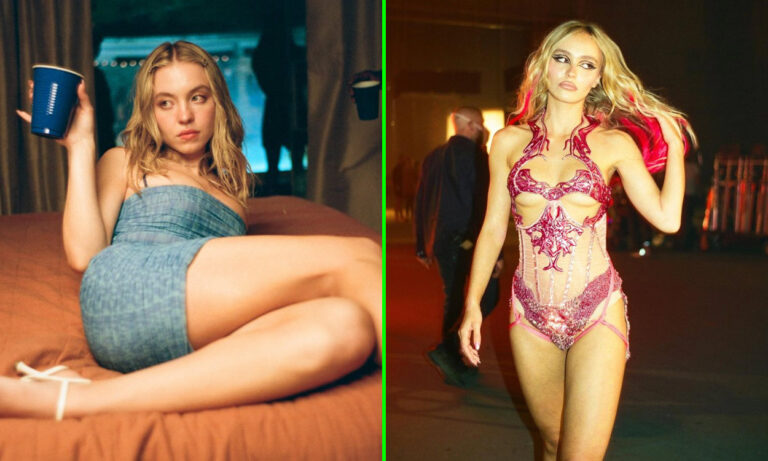The Idol’s toxic set revelations: How long until Sam Levinson’s career crashes and burns?
At the end of 2021, as we patiently waited and lingered in excitement for the makeup, plot lines and soundtrack of Euphoria season two to be released, controversial filmmaker Sam Levinson gifted the gemstone-wearing gen Zers of the world with news of another upcoming TV show—one that was set to be his most daring project yet. And, for good measure, he put two of the internet’s favourite stars at the forefront: notorious nepo baby Lily-Rose Depp, and musician Abel Tesfaye, aka The Weeknd.
The Idol, marketed as HBO’s hot and sleazy take on troubled popstars, cult leaders, and female sexuality, has been filling our timelines for over a year now. And, while it was due to be a devastatingly raw exposé on the female perspective, and more specifically on how young women within the music industry have been historically corrupted and used by male figures who take advantage of their success, it’s now become an online case study in on-set turmoil, impulsive directors, and it’s shone a seemingly negative light on Levinson himself.
On 1 March 2023, Rolling Stone released an article titled: ‘The Idol’: How HBO’s Next ‘Euphoria’ Became Twisted ‘Torture Porn’. Within the piece, the publication stated that 13 sources from within The Idol’s production had come forward with stories of hellish reshooting and a toxic work culture.
One former crew member even noted: “What I signed up for was a dark satire of fame and the fame model in the 21st century. The things that we subject our talent and stars to, the forces that put people in the spotlight and how that can be manipulated in the post-Trump world. It went from satire to the thing it was [satirising].”
Supposedly, the chaos first began to unfurl when director Amy Seimetz departed from the project. Levinson allegedly then took over at the helm—or, more likely, snatched it back—and regeared the show’s plot, placing an emphasis more on how much nudity he could capture, rather than how culturally impactful the script could be.
Ramping up the depravity of the characters, allegedly in an attempt to top the sex scenes in his previous project Euphoria, Levinson clearly created an on-set environment so hostile and uncomfortable that crew members felt it necessary to expose him.
For example, a source revealed to Rolling Stone that one scene involved Tesfaye’s character violently punching Depp’s character in the face, after which she smiles and asks to hit her some more, thus provoking an erection from her aggressor.
Levinson has been heavily criticised in the past for sexualising aggression in a way that’s non-conducive to the filming process. Not only would this particular scene make for a horrifically triggering and uncomfortable watch, it has zero purpose other than satisfying the creator’s highly perverted need for the domination and subjugation of women.
Depp, seemingly unfazed by the crew’s concerns and by the filming process, is solidly standing by Levinson, having released a statement saying: “Sam is, for so many reasons, the best director I have ever worked with. Never have I felt more supported or respected in a creative space, my input and opinions more valued. Working with Sam is a true collaboration in every way—it matters to him, more than anything, not only what his actors think about the work, but how we feel performing it.”
Sam Levinson’s career has been questionable for some time now
Is anyone truly surprised by these recent revelations? Levinson’s methods and chosen topics when it comes to filmmaking have always been highly questionable. When Euphoria first hit our screens, the creator was championed for being a ground-breaking and daring renegade. But as the mist dissipated, and as Levinson’s behind-the-scenes directions became more apparent, we all came to realise that perhaps he’s a lot more sinister than previously suspected.
In early 2022, in an interview with The Independent, Sydney Sweeney (who plays Cassie in Euphoria) stated that, while she was proud of the work she’d done on the HBO show, she felt as though there had been numerous time where she’d needed to request nudity be removed from the script.
Moreover, co-star Chloe Cherry (who plays Faye) told The Daily Beast that Levinson had wanted to shoot a number of her opening scenes with her completely naked, something she didn’t feel was necessary.
There’s also a lot to be said about how Levinson treated actress Barbie Ferreira (Kat). In season one, Ferreira’s character represented a highly important character arc regarding body expression, sexuality and identity. However, fans were dismayed when they saw that Kat had all but been removed from season two entirely. Allegedly, the pair had feuded on-set and subsequently the creator omitted Kat from every major plot and subplot within the show. The red flags just keep piling up…
Levinson may not be the first filmmaker to fetishise the high school experience, but he’s definitely capitalised on building a show which takes complex and unique female characters only to subject them to abuse and trauma. The heinous love triangle of Maddie, Cassie and Natie in season two can attest to that.
There is one question that remains: Will Levinson’s muse Zendaya continue to associate herself with the now-tarnished creator? The Emmy-winning performance of the actress and her portrayal of drug addict Rue in Euphoria had previously been Levinson’s saving grace. Now, however, with The Idol in tatters and the feeding frenzy continuing to grow, it’ll be interesting to see if Zendaya, whose reputation has been squeaky clean throughout her career, will stick by Levinson or swim to safety.






